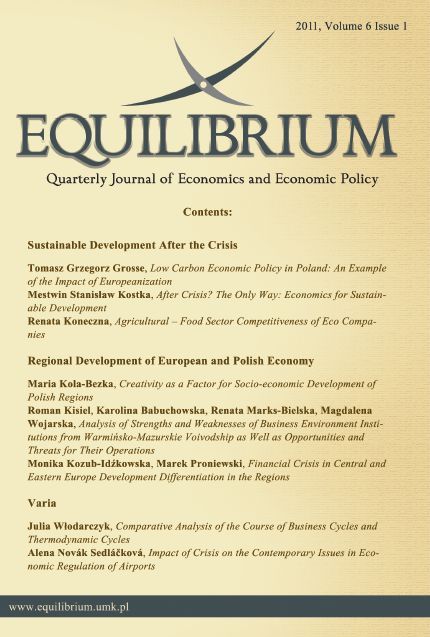Comparative Analysis of the Course of Business Cycles and Thermodynamic Cycles
DOI:
https://doi.org/10.12775/EQUIL2011.007Keywords:
business cycles, thermodynamic cycles, contraction, efficiencyAbstract
Mainstream economics tends to perceive economic systems in a mechanistic way, which makes it impossible to grasp the notion of the irreversibility of real economic processes and thus encourages referring to the achievements of thermodynamics.Although economic equivalents of thermodynamic quantities have been discussed for more than a hundred years, a significant development of thermodynamic techniques of modeling economic phenomena, that could complement standard econometric methods, has not been observed.It seems that a comparative analysis of the course of thermodynamic and business cycles could enhance the understanding of the mechanisms underlying business cycles, especially in the context of mutual relations between economy and its environment.The aim of this article is to discuss some similarities and differences between economic and thermodynamic systems (heat engines and heat pumps). In particular, the problem of performing positive or negative work by an economy is considered and illustrated by the analysis of statistical data referring to the American and Polish economies.
Downloads
References
Bryant J. (2009), Thermoeconomics. A Thermodynamic Approach to Economics, VOCATInter-national, Harpenden.
Bureau of Economic Analysis (2011), http://www.bea.gov (as of 15.03.2011).
Bureau of Labor Statistics (2011), http://www.bls.gov (as of 15.03.2011).
Central Statistical Office in Poland (GUS2011), http://www.stat.gov.pl (as of 15.03.2011).
Drăgulescu A., Yakovenko V.M. (2000), Statistical mechanics of money, ?European Physical Journal B?, vol. 17.
Heryng Z. (1896), Logika ekonomii. Zasadnicze pojęcia ekonomiczne ze stanowiska nauki o energii, Wyd. ?Głosu?, Warszawa.
National Bureau of Economic Research (2011), http://www.nber.org (as of 15.03.2011).
Perison A.G. (2001), Uncertainty, Indeterminacy and Shannon?s Derivation of Entropy: Implications for Policy Administration ? A Systems Theoretical Approach, Working Paper, http://ideas.repec.org/p/wpa/wuwpma/0112001.html (as of 15.03.2011).
Samuelson P. (1972), Maximum Principles in Analytical Economics, ?The American Economic Review?, Vol. 62. DOI: http://dx.doi.org/10.1126/science.173.4001.991
Szargut J. (2000), Termodynamika, PWN, Warszawa.
Włodarczyk J. (2008), Ekonomia jako nauka o energii społecznej w polskiej myśli ekonomicz?nej przełomu XIX i XX wieku, [in:] Zagóra-Jonszta U. (ed.), Zagadnienia ekonomiczne w ujęciu historycznym oraz teorii i polityki gospodarczej, Studia Ekonomiczne nr 54, Wyd. Uczelniane Akademii Ekonomicznej w Katowicach, Katowice.






